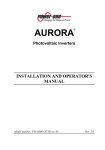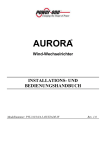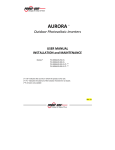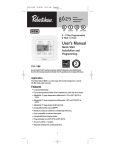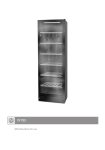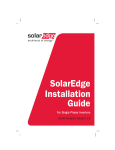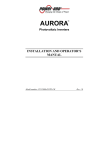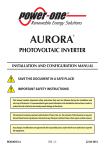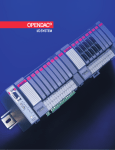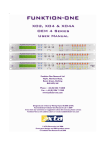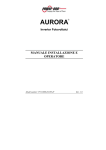Download PVI-6000-OUTD-US-W
Transcript
® AURORA Wind Inverters INSTALLATION AND OPERATION MANUAL Model number: PVI-6000-OUT-US-W Rev. 2.0 User Manual (PVI-6000-OUTD-US-W Rev.2.0) Page 2 of 77 REVISION TABLE Document Revision Author Date Rev 1.0 Nocentini Danio Sep.20, 2007 Rev 2.0 Mikhail Guz Sep. 26, 2008 Change Description Updated connection diagram, miscellaneous changes SAVE THESE INSTRUCTIONS! IMPORTANT SAFETY INSTRUCTIONS POWER-ONE: Reproduction and disclosure, even partially, of the contents of this manual are strictly forbidden without prior authorization of Power-One. User Manual (PVI-6000-OUTD-US-W Rev.2.0) Page 3 of 77 IMPORTANT SAFETY INSTRUCTIONS This manual contains important safety and operational instructions that must be accurately understood and followed during the installation and maintenance of the equipment. To reduce the risk of electrical shock hazards, and to make sure the equipment is safely installed, special safety symbols are used in this manual to highlight potential safety hazard and important safety information. The symbols are: WARNING: the paragraphs highlighted by this symbol contain processes and instructions that must be absolutely understood and followed to avoid potential danger to people. NOTE: the paragraphs highlighted by this symbol contain processes and instructions that must be rigorously understood and followed to avoid potential damage to the equipment and negative results. The equipment is provided with several labels, some of them with a yellow background, which are related to safety issues. Make sure to read the labels and fully understand them before installing the equipment. The labels utilize the following symbols: Equipment grounding conductor (Main protective grounding, PE) Alternate Current (AC) value Direct Current (DC) value Phase Grounding (Earth) User Manual (PVI-6000-OUTD-US-W Rev.2.0) Page 4 of 77 USEFUL INFORMATION AND SAFETY STANDARD INTRODUCTION ¾ The installation of AURORA must be performed in full compliance with national and local standards and regulations. ¾ AURORA has no spare parts to replace. For any maintenance or repair, please, contact the nearest authorized repair centre. Please contact your reseller if you need to know the nearest authorized repair facility. ¾ Read and understand all the instructions contained in this manual and become familiar with the safety symbols in the relevant paragraphs before you install the equipment ¾ The connection to the distribution grid must be done only after receiving approval from the distribution utility as required by national and state interconnection regulations, and can be done only by qualified personnel. ¾ The wind turbine need to be blocked with a mechanical brake prior to be connected to AURORA to make sure that there is no voltage on the cable that can result in a dangerous safety hazard. User Manual (PVI-6000-OUTD-US-W Rev.2.0) Page 5 of 77 GENERAL During inverter operation, some parts can be powered, some not insulated and, in some cases, some parts can move or rotate, or some surfaces be hot. Unauthorized removal of the necessary protections, improper use, wrong installation or wrong operation may lead to serious damage to people and objects. Transport, handling, installation, commissioning and maintenance must be performed by qualified and trained personnel (all relevant accident prevention rules must be strictly observed) According to these basic safety rules, qualified and trained people must possess skills required for assembly, start-up and operation of the product, and have necessary qualifications to perform such operations. ASSEMBLY Devices shall be assembled and cooled according to the specifications mentioned in the corresponding documents. In particular, during transportation and handling, parts shall not be bent and/or the insulation distances shall not be changed. There should be no contact between electronic parts and connection terminals. Electrical parts must not be mechanically damaged or destroyed (potential health risk). ELECTRICAL CONNECTION With the inverter powered, comply with all national regulations on accidents prevention. Electrical connections shall be carried out in accordance with the applicable regulations, such as conductor sections, fuses, PE connection, etc. User Manual (PVI-6000-OUTD-US-W Rev.2.0) Page 6 of 77 OPERATION Systems with inverters shall be provided with further control and protective devices in compliance with the corresponding safety rules, such as those relating to the compliance with technical equipment, accident-preventing regulations, etc. Any calibration change shall be made using the operational software. Once the inverter has been disconnected from the power grid, powered parts and electrical connections shall not be touched as some capacitors could be charged. Comply with all corresponding marks and symbols present on each device. During operation, make sure that all covers and doors are closed. MAINTENANCE AND SERVICE Comply with manufacturer’s recommendations. SAVE ALL DOCUMENTS IN A SAFE PLACE! User Manual (PVI-6000-OUTD-US-W Rev.2.0) Page 7 of 77 PVI-6000-OUTD-US-W This document applies to the above-mentioned inverters, only. Fig.1 Name plate The name plate affixed to the inverter provides the following information: 1) Manufacturing Part Number 2) Model Number 3) Serial Number 4) Week/Year of Manufacture User Manual (PVI-6000-OUTD-US-W Rev.2.0) Page 8 of 77 CONTENTS: 1 INTRODUCTION .................................................................. 11 2 SYSTEM DESCRIPTION..................................................... 11 2.1 KEY ELEMENTS OF A WIND ENERGY SYSTEM: “WIND TURBINE” AND “GENERATOR” ..................................................................................................... 11 2.2 DATA MONITORING AND TRANSMISSION .................................................... 14 2.3 TECHNICAL DESCRIPTION .......................................................................... 14 2.4 SAFETY FEATURES .................................................................................... 15 2.4.1 Anti-Islanding ........................................................................................... 15 2.4.2 Wind generator Ground Fault .................................................................. 15 2.4.3 Additional saftey features ......................................................................... 15 3 INSTALLATION ................................................................... 16 3.1 3.2 3.3 3.4 3.5 3.6 3.7 PACKAGE INSPECTION ............................................................................... 16 INSPECTING PACKAGE CONTENTS .............................................................. 17 SELECTING THE PLACE OF INSTALLATION .................................................. 18 WALL MOUNTING ...................................................................................... 19 BEFORE PERFORMING ELECTRICAL CONNECTIONS ..................................... 22 ELECTRICAL CONNECTIONS....................................................................... 25 STEP 6/6 (OPTIONAL): CONNECTION OF THE FREQUENCY SIGNAL FROM THE WIND TURBINE. ................................................................................................. 27 3.8 HOW TO ACCESS THE INTERNAL TERMINAL BOARDS THROUGH THE FRONT PANEL ........................................................................................................... 27 3.9 REPLACING THE CR2032 LITHIUM BATTERY ............................................. 28 3.10 REPLACING THE MEMORY .......................................................................... 29 4 START UP .............................................................................. 29 5 M ONITORING AND DATA TRANSMISSION................ 31 5.1 5.2 5.2.1 5.2.2 5.3 5.4 USER’S INTERFACE MODE ......................................................................... 31 AVAILABLE DATA ..................................................................................... 33 Real-time operational data ....................................................................... 33 Internally logged data............................................................................... 34 LED INDICATORS ...................................................................................... 34 MESSAGES AND ERROR CODES .................................................................. 39 User Manual (PVI-6000-OUTD-US-W Rev.2.0) 5.5 5.5.1 5.5.2 5.5.3 5.5.4 5.5.5 Page 9 of 77 DISPLAY LCD ........................................................................................... 42 Connection of system to the grid .............................................................. 42 Error messages......................................................................................... 43 First phase - electric parameter monitoring............................................. 44 Main menu ................................................................................................ 47 Statistics.................................................................................................... 47 5.5.5.1 5.5.5.2 5.5.5.3 5.5.5.4 5.5.5.5 5.5.5.6 5.5.5.7 5.5.5.8 Lifetime.................................................................48 Partial ....................................................................48 Today ....................................................................49 Last 7 days ............................................................49 Last Month ............................................................49 Last 30 Days .........................................................50 Last 365 Days .......................................................50 User period............................................................50 5.5.6 Settings ..................................................................................................... 51 5.5.6.1 5.5.6.2 5.5.6.3 5.5.6.4 5.5.6.5 5.5.6.6 5.5.6.7 5.5.6.8 5.5.6.9 5.5.6.10 5.5.6.11 5.5.6.12 5.5.6.13 Address .................................................................52 Display set.............................................................52 Service...................................................................53 New password .......................................................53 Cash.......................................................................53 Time ......................................................................54 Language...............................................................54 START UP voltage ...............................................54 Autotest .................................................................54 Alarm ................................................................55 Remote control..................................................56 UV Prot.time .....................................................57 Alarm Message .................................................57 .................................................................57 5.5.7 Info............................................................................................................ 59 6 DATA MONITORING AND COMMUNICATION ...........61 6.1 CONNECTION THROUGH RS-485 SERIAL PORT OR RJ12 CONNECTOR ........ 61 6.1.1 RS-485 serial port..................................................................................... 61 6.1.2 RJ12 connectors ....................................................................................... 62 User Manual (PVI-6000-OUTD-US-W Rev.2.0) Page 10 of 77 6.1.3 Daisy chain ............................................................................................... 63 6.2 SERIAL CONNECTION WITH USB PORT ....................................................... 65 6.3 MEASUREMENT ACCURACY ...................................................................... 66 7 TROUBLESHOOTING......................................................... 67 8 TECHNICAL FEATURES ................................................... 69 8.1 8.2 8.3 8.4 8.5 INPUT VALUES ........................................................................................... 69 OUTPUT VALUE ......................................................................................... 70 GRID PROTECTION CHARACTERISTICS ........................................................ 70 GENERAL CHARACTERISTICS ..................................................................... 71 POWER DERATING ..................................................................................... 72 User Manual (PVI-6000-OUTD-US-W Rev.2.0) 1 Page 11 of 77 INTRODUCTION This document contains technical description of AURORA Wind inverters. It is intended to provide the installers and users with all the necessary information about installation, operation, and use of AURORA Wind inverters. 2 SYSTEM DESCRIPTION The AURORA inverter is capable of feeding power to the grid converting the power generated by a wind turbine. The wind turbine (using a generator) converts the mechanical energy from wind into the 3-phase AC voltage. The voltage and frequency of the AC generated by the wind turbine are variable and depend on the wind speed. To be exported to the utility grid the power need to be converted to the frequency and voltage level of the grid. When used in parallel with the grid, the alternate current generated by the inverter is directly fed into the distribution circuit, which is also connected to the public power distribution grid. The wind energy system can thus powers all the connected users, such as lighting devices, household appliances, etc. When the wind turbine is not generating enough energy, the power required by the connected users is provided by the public power grid. If the energy produced by the wind turbine exceeds the quantity required by the user’s loads, then extra power is directly fed to the grid, becoming available to other users. According to national and local standards and regulations the energy produced can be sold to the electrical utility or credited to the user against future consumption, thus providing financial savings. 2.1 Key elements of a wind energy system: “WIND TURBINE” and “GENERATOR” Two elements are necessary in order to harvest the wind energy: a wind turbine that will spin based on the wind speed and a generator. The turbine forces the generator to rotate thus producing energy that can be exported to the grid. The most common turbine design has a horizontal rotor with 2 or 3 vertical fiberglass blades forming the propeller which may have a fixed or a variable tilt. The generator is fixed on the rotor. Usually for the small wind system a synchronous permanent magnet generator is used. The current generated by this User Manual (PVI-6000-OUTD-US-W Rev.2.0) Page 12 of 77 type of generators has variable voltage and frequency depending on the turbine speed. To be exported to the grid this needs to be is converted to current. The conversion is done in 2 steps: A) The 3-phase AC voltage from the generator is filtered and converted to the DC voltage. This conversion can be done inside the turbine or using an interface box between the generator and the inverter. B) The resulting DC output is connected to the AURORA input and converted into AC power with the appropriate voltage and frequency to be exported to the grid. Wind Turbine Generator Fig. 2 Wind Turbine – Generator User Manual (PVI-6000-OUTD-US-W Rev.2.0) Page 13 of 77 WARNING: The DC voltage input to the inverter shall not exceed 600Vdc for any reason, in order to avoid damage to the equipment. NOTE: A minimum input voltage of 50Vdc is required for the AURORA inverter to start the grid connection sequence. Once connected, the AURORA inverter will transfer the maximum power available for any input DC voltage value in a 50V to 580Vdc range to the grid. The max output current from the generator or an interface device shall be always within the inverter limits. In the AURORA inverter the total max input current is 36Adc. Wind Turbine Generator AC Grid Rectifier/ Interface DC Disconnect (2-pole) DC Voltage AC Voltage AC disconnect (3-pole) Fig. 3 Wind energy system diagram User Manual (PVI-6000-OUTD-US-W Rev.2.0) 2.2 Page 14 of 77 Data monitoring and transmission In system with more than one inverter, remote monitoring can be implemented through a sophisticated communication system based on an RS-485 serial interface. A USB port is available in the inverter to facilitate access during installation. An optional AURORA Easy-Control system is also available for remote monitoring via the Internet, analogue modem or GSM digital modem. 2.3 Technical Description Figure 4 shows a block diagram of the AURORA inverter. The main elements are the input DC-DC converters (further “boosters”) and the output DC-AC inverter. Both the DC-DC converters and the output inverter operate at high switching frequency to enable a compact design and relatively low weight. Foe increased conversion efficiency, the version of the AURORA inverter does not have a transformer therefore no galvanic isolation is provided between the input and output. However, the AURORA inverter is equipped with the necessary safety features to ensure safe operation in compliance with all applicable regulations without an isolation transformer. Fig.4 AURORA inverter block-diagram User Manual (PVI-6000-OUTD-US-W Rev.2.0) Page 15 of 77 The block diagram shows an AURORA PVI-6000-OUTD with the two input DCDC converters; in the Wind version the 2 converters are always connected in parallel. Thanks to its high efficiency and excellent thermal design, the AURORA inverter provides maximum power operation in a broad range of ambient temperatures. The inverter is controlled by two independent DSPs (Digital Signal Processors) and one central microprocessor. This way, grid connection is controlled by two independent computers in full compliance with electrical power supply and safety regulations. The AURORA operating system continuously communicates with all functional blocks and processes the data to ensure optimal performance, as well as the highest possible efficiency under all wind speed and load conditions, always in full compliance with the applicable directives, standards and regulations. 2.4 Safety Features 2.4.1 Anti-Islanding When the local power distribution grid fails or when it is shut down for maintenance, the AURORA inverter shall be disconnected from the grid, to protect the people working on the grid, and in full compliance with the applicable national standards and regulations. To avoid any possible islanding operation, the AURORA inverter is equipped with the automatic disconnection protective system called Anti-Islanding. The AURORA PVI-6000-OUTD-US-W model is equipped with a state-of-the-art anti-islanding protection system certified to the following standards and regulations: ¾ UL 1741 standard 2.4.2 Wind generator Ground Fault A sophisticated ground protection circuit continually monitors the ground connection. When a ground fault is detected, this circuit shuts down the AURORA inverter and turns on the red LED on the front panel to indicate a ground fault condition. The AURORA inverter is equipped with a terminal for the system grounding conductor; see section 3.6 for more details. NOTE: For more details regarding the AURORA shutdown or possible causes of malfunction, please, refer to sections 5.3 and 5.4. 2.4.3 Additional saftey features The AURORA inverter is equipped with additional protections to guarantee safe operation under any circumstances. The protections include: User Manual (PVI-6000-OUTD-US-W Rev.2.0) Page 16 of 77 ¾ constant monitoring of the grid voltage to ensure that voltage and frequency remain within the specified limits (in accordance with the UL 1741 standard); ¾ automatic power limit based on internal temperature monitoring to avoid overheating (heat sink temperature ≤70°C [158°F]). The redundancy of safety features implemented in the AURORA inverter guarantees completely safe operations under any conditions 3 INSTALLATION WARNING: The electrical installation of AURORA must be performed in compliance with applicable local and national standards and laws. WARNING: The connection of AURORA to the electrical distribution grid must be performed only after receiving authorization from the utility that operates the grid 3.1 Package Inspection NOTE: The shipper delivered your AURORA inverter to the carrier safely packaged and in perfect condition. Upon acceptance of the package, the carrier assumes responsibility for its safe delivery. In spite of careful handling during transportation, damage to package or its contents sometimes occurs. The customer is encouraged to perform the following checks: ¾ Inspect the shipping box for apparent damage, such as holes, cracking, or any signs of possible damage to its contents. ¾ Record any damage or shortage in the receiving documents and have the carrier sign his/her full name. ¾ Open the shipping box and inspect the contents for internal damage. While unpacking, be careful not to discard any equipment, parts or manuals. If any damage is detected, call the delivering carrier to determine the appropriate action. Save all shipping material in case the carrier should send an inspector to verify damage! ¾ If the inspection reveals damage to the AURORA inverter, call your supplier, or authorized distributor. They will determine if the equipment should be returned for repair. They will also provide instructions on how to get the equipment repaired. ¾ It is the customer's responsibility to file a claim with the carrier. Failure to file a claim with the carrier may void all warranty service rights for any damage. User Manual (PVI-6000-OUTD-US-W Rev.2.0) ¾ 3.2 Page 17 of 77 Save the original package your AURORA inverter arrived in for use in case you should need to return it for repair in the future. Inspecting package contents Description Inverter AURORA Bag containing: 6.3x70 screws 3 pc. 3 SX10 wall anchors 3 pc. Torx20 wrench 1 pc M6x10 screw 1 pc d.18 washer 1 pc Copy of this manual Certificate of warranty CD-ROM with communication software Quantity 1 1 1 1 1 User Manual (PVI-6000-OUTD-US-W Rev.2.0) 3.3 Page 18 of 77 Selecting the place of installation The installation place should be selected based on the following considerations: ¾ Height from ground level should be enough to ensure that display and status LEDs are easy to read. ¾ Select a well ventilated place sheltered from direct sun radiation. Choose a place that allows unobstructed airflow around the unit. ¾ Allow sufficient room around the unit to enable easy installation and removal from the mounting surface. ¾ A door is provided on the unit’s front panel for hardware maintenance purpose. The USB port for software connection is on the right side of the inverter (protected by a cover); installation should provide free access to this side, otherwise you will have to remove the unit from its mounting surface during maintenance operations. The following figure shows the recommended minimum clearances around the inverter: 6” 2” 6” 8” << Fig.5. Minimum clearances around AURORA inverter User Manual (PVI-6000-OUTD-US-W Rev.2.0) 3.4 Page 19 of 77 Wall mounting AURORA should be mounted in a vertical position as shown in Fig.6. The package includes a hardware kit with three 6.3x70 steel screws and 3 SX10 wall anchors for installation of a metal bracket to a masonry wall. Screws and wall anchors can be installed using 3 of the 5 holes available on the bracket (reference part C in the pictures below). WARNING: Bracket shall be mounted vertically on wall: spring side shall face up, while side with M6 PEM shall face down. Since the wall can be made from different construction materials, it is the installer's responsibility to provide suitable mounting hardware. We recommend using stainless steel screws. For concrete wall mounting the hole should be min. 8 mm in diameter and min. 70 mm deep. Hang AURORA on the spring at the bracket top, by means of the metal mount fastened to the upper part at inverter back. The central part of this plate features a seat for fastening the spring (see Part A in Fig. 6). Once inverter top end is secured in place, you need to secure its bottom end. From inverter front, use an M6x10 screw and washer to secure the unit to the bracket PEM, starting with the center slot of the lower plate (Part B in Fig. 6). Part.A Part.B FRONT BACK User Manual (PVI-6000-OUTD-US-W Rev.2.0) Page 20 of 77 Part.B Part.A Fig.6. AURORA wall mounting Part.D Part.C NOTE: Ensure that the AURORA inverter is not exposed to direct sun radiation or other external heat sources, including the units installed underneath it (see Fig. 7). If several inverters are stacked up, the heat generated by the inverters placed at the bottom of the stack could cause ambient temperature to rise and affect the operation of the inverters in the upper rows. Temperatures exceeding 40°C could result in the derating of the output power of the units placed in the upper rows. A combination of high output power and high ambient temperature will result in a significant power derating and a lower energy production. For proper cooling, make sure to install AURORA to allow unobstructed air flow (for instance, the front panel should never face a solid surface). User Manual (PVI-6000-OUTD-US-W Rev.2.0) Page 21 of 77 RECOMMENDED ARRANGEMENT Fig.7. Recommended installation of AURORA inverters NOTE: Although tilted mounting is allowed (see Fig. 8) it will cause increased power dissipation and may result in output power derating. WARNING: Unit surface may become very hot during operation. DO NOT touch unit surface to avoid burns. NO Derating -5° Derating 0° Derating 5° Derating Fig.8 Tilted mounting User Manual (PVI-6000-OUTD-US-W Rev.2.0) 3.5 Page 22 of 77 Before performing electrical connections WARNING: Electrical connections shall be performed only after the AURORA inverter is securely mounted to the wall. WARNING: The connection of the AURORA inverter to the electrical distribution grid must be performed by qualified operators and only after receiving authorization from the utility that operates the grid. WARNING: For a step-by-step description of the correct procedure, please, read and follow the instructions provided in this section (and its subsections) while observing all safety warnings. Any operation that does not comply with the instructions can lead to conditions hazardous to personnel and/or equipment damage. WARNING: Always respect the nominal ratings of voltage and current defined in Section 8 (Technical Characteristics) when designing your system. When designing the system make sure the following limits are never exceeded: ¾ ¾ Maximum DC voltage input: 600Vdc under any condition. Maximum DC current input to the 2 parallel input: 32Adc under any condition. WARNING: Check the National and local standards and regulations to make sure your electrical installation and design are in compliance with them. NOTE: In accordance with the typical assembly diagram (see Fig. 9) an AC disconnect switch with the overload protection (breaker) must be used to connect the AURORA inverter to the grid. Recommended ratings for the disconnect switch are 40A, 240VAC. User Manual (PVI-6000-OUTD-US-W Rev.2.0) Page 23 of 77 Rete Generator AC Disconnect switch AC Disconnect switch 3-phase Max. Rating 40A/400Vac Loads Max. Rating 40A/240Vac Rectifier/ Wind Interface Fig.9. Wiring diagram WARNING: When disconnecting the AURORA inverter, always open the AC disconnect switches to disconnect the inverter from the grid and from the generator. Wait until the LEDs on the front panel turn off before unplugging the multiple contact connections from the DC input. WARNING: When selecting the power supply cables for AURORA connections, carefully consider nominal operating voltage, insulation voltage, maximum operating temperature, current density and flammability rating. All of these values must comply with the maximum current density ratings required by applicable local rules. A key parameter to consider in cable selection is cable loss, as exceeding loss will lead to lower efficiency. The maximum diameter allowed for the conductors to be assembled to the terminal blocks for grid connection is 0.16”. The supplied M32 cable gland accepts wires up to 0.19”. The following items are located on the bottom of the inverter (see Fig. 10, from right to left): ¾ Two holes sealed with waterproof caps. Remove the caps to gain access to the connectors for data serial transfer via the RS485 port. One hole is for the input serial cable and the other for an output cable, if fitted (output cable is required when several inverters are connected in a daisy-chain configuration, see Section 6). User Manual (PVI-6000-OUTD-US-W Rev.2.0) ¾ ¾ Page 24 of 77 Cable gland for AC grid connection Cable gland for DC connection to the rectifier. Fig. 10. Connectors on the bottom of the inverter and their labels ¾ WARNING: When making the electrical connections follow the procedure exactly to avoid exposure to dangerous voltages. Each step of the procedure is explained in the following paragraphs. To disconnect the AURORA inverter, perform steps 1/6 and 2/6 and then disconnect the AC and DC connectors. The wind turbine need to be blocked with a mechanical brake prior to be connected to the AURORA inverter to make sure that there is no voltage on the cable that can result in a safety hazard. User Manual (PVI-6000-OUTD-US-W Rev.2.0) 3.6 Page 25 of 77 Electrical Connections Step 1/6: Open the AC grid disconnect switch Step 2/6: Open the Wind Generator AC disconnect breaker. Step 3/6: Unscrew the 4 screws to open the front panel Step 4/6: Connect the inverter to the AC grid disconnect switch WARNING: Use suitable low-impedance cables to connect the inverter to the AC disconnect switch. WARNING: The inverter must be connected to the AC grid disconnect switch using a three-wire cable with two line wires and a neutral wire. 1) Route the cable from the inverter to the AC disconnect 2) Connect the three-pole cable to AURORA using the cable gland on the case 3) Connect the three wires as follows: - terminal 1 – to Line 1 - terminal 2 – to Line 2 - terminal 3 – to Neutral (center tap of the split phase) Fig.11 AC wire terminal block WARNING: Default connection of the inverter is to the grid configured as a 240V split phase system. Contact Power-One if your grid is configured as a single phase or a three-phase system. User Manual (PVI-6000-OUTD-US-W Rev.2.0) Page 26 of 77 WARNING: Do not reverse line and neutral as it might make the system unsafe to run and cause malfunctioning. NOTE: If you have installed a meter between the AC disconnect and the AURORA inverter, follow the procedure outlined above when connecting to the meter. Step 5/6: Connect AURORA to the Rectifier/Wind Interface Box WARNING: Prior to connecting the AURORA inverter to the rectifier check, using a proper meter, that the polarity and the voltage value between the positive and negative terminal are correct. The output voltage polarity from the rectifier should match the “+” and “-” symbols. Referring to Fig.12 use the following procedure: 1) Verify the presence of the two wires connecting the two DC input channels in parallel (the inverter is shipped from the factory with the two wires already connected). 2) Connect the positive DC cable from the rectifier or Wind Interface to the positive terminal block inside the AURORA inverter (red cable on Fig 12). 3) Connect the negative DC cable from the rectifier or Wind Interface to the negative terminal block inside the AURORA inverter (black cable on Fig 12). User Manual (PVI-6000-OUTD-US-W Rev.2.0) Page 27 of 77 Wind frequency input Fig.12. DC section cables Power-One recommends using the Wind Interface box p/n PVI-7200-WindInterface-US. Refer to the Aurora Wind Interface User Manual for more details. 3.7 Step 6/6 (optional): Connection of the frequency signal from the wind turbine. If the MPPT is set using the wind turbine frequency, the frequency signals available from the rectifier (marked Wind Speed + , Wind Speed – on the AURORA Wind Interface) shall be connected to the pins marked +WT and –WT on the terminal bock of the AURORA inverter shown in Fig. 12. 3.8 How to access the internal terminal boards through the front panel WARNING: Shock hazard! Before removing the front panel, disconnect AURORA from both the AC and DC side and allow 5 minutes for the internal capacitors to discharge. To remove the front panel, remove the 4 screws as shown in Fig. 13 using the flatblade screwdriver. User Manual (PVI-6000-OUTD-US-W Rev.2.0) Page 28 of 77 3 1 4 2 Fig.13 AURORA with front panel After replacing the front panel, tighten the screws to 1.5 Nm (13.2 in-lbs) to ensure proper sealing. 3.9 Replacing the CR2032 lithium battery WARNING: This component should only be replaced by qualified personnel. The AURORA inverter has a CR2032 lithium battery. When the battery is nearing the end of its life, a corresponding message appears on the LCD display. To replace the battery, remove the front panel (see Fig. 13) to get access to the battery holder shown in Fig. 14. Note that the battery will not fit into its holder when pressed from the top down. Instead, slide the battery into its holder from the side, while holding it tilted at a 30° angle. Fig. 14 Battery in place User Manual (PVI-6000-OUTD-US-W Rev.2.0) 3.10 Page 29 of 77 Replacing the memory All energy output logs are stored in this memory. If you need to replace the inverter, the memory can be removed from the old unit and placed into the new inverter. This way, you will retain all system logs and keep saving future daily logs into the same memory (see Fig. 15) Fig. 15 Inverter memory WARNING: This component should only be replaced by qualified personnel. WARNING: Make sure to insert the memory connector pins correctly into the board connector. 4 START UP WARNING: Do not place any items on AURORA during operation. WARNING: Do not touch the heat sink when the inverter is operating, as some parts may be hot and cause burns. User Manual (PVI-6000-OUTD-US-W Rev.2.0) Page 30 of 77 Start-up procedure: 1) Switch the AC breaker ON. If the speed of the turbine is high enough to generate at least 50V DC on the rectifier output, the AURORA inverter will turn on (the display lights on). Note that the inverter is powered directly from the wind generator; therefore if the turbine is not rotating, the inverter will turn OFF. 2) Switch the Grid DC breaker ON. 3) Once both breakers are ON, the inverter starts the grid connection sequence. The check routine may take from 30 seconds up to several minutes, depending on grid condition. The routine is indicated by the flashing green LED marked POWER. Three screens are shown on the display during the check routine: • Measuring isolation resistance: “Measuring Riso…” , connection in progress with progress indication. • Grid voltage value and status compared to specified values (within/outside range). • Grid frequency value and status compared to specified values (within/outside range). 4) When the connection sequence is completed, the AURORA inverter starts operating. Normal operation is indicated by a warning sound and the green LED staying permanently ON. This means that wind energy is sufficient to export power to the grid. 4) If the check routine gave a negative result, the inverter will repeat the procedure until all grid voltage and frequency parameters and grid configuration are found to be in the specified range. During this process, the green LED will keep flashing. User Manual (PVI-6000-OUTD-US-W Rev.2.0) 5 5.1 Page 31 of 77 M ONITORING AND DATA TRANSMISSION User’s Interface Mode WARNING: The RS-485 cable must provide at least 600V insulation. The AURORA inverter operates automatically and needs no particular supervision. If the turbine speed is not enough to generate power for the grid, the inverter disconnects automatically and goes into the standby mode. The operating cycle is resumed automatically when the turbine speed and therefore the input voltage become high enough. This is indicated by the LEDs. The AURORA inverters can provide operational data in the following ways: ¾ LED indicators ¾ Operational data on the LCD display ¾ Data transmission on a dedicated serial RS-485 line. Data can be collected by a PC or a data logger equipped with an RS-485 port. If an RS-485 line is used, it may be convenient to use the AURORA RS-485/RS232 Serial Interface Converter model number PVI-RS232485. An optional AURORA Easy Control data logger is also available. ¾ Data transmission via a USB cable. This type of connection is typically used when monitoring a single inverter and for maintenance purposes. To connect the USB cable, remove the waterproof plug at the bottom end of the inverter’s right wall (Fig.16). Fig.16 USB port location User Manual (PVI-6000-OUTD-US-W Rev.2.0) Fig. 17 Data Transmission Options Page 32 of 77 User Manual (PVI-6000-OUTD-US-W Rev.2.0) 5.2 Page 33 of 77 Available Data AURORA provides two types of data that can be collected using the suitable interface software. 5.2.1 Real-time operational data Real-time operational data can be transmitted on demand through the communication lines and are not stored by the inverter. The AURORA Communicator software is available on the installation CD and may be used to transmit data to a PC (check for the latest version on www.power-one.com). The following data is available: ¾ ¾ ¾ ¾ ¾ ¾ ¾ ¾ ¾ ¾ ¾ ¾ ¾ ¾ ¾ ¾ ¾ ¾ Grid voltage Grid current Grid frequency Power transferred to the grid Wind generator voltage Wind generator current Heatsink temperature) Serial Number and Part Number Manufacturing week Firmware revision code Daily energy output Leakage current of the system Total energy Partial energy Mean grid voltage Insulation resistance Leakage current to ground Date and time User Manual (PVI-6000-OUTD-US-W Rev.2.0) 5.2.2 Page 34 of 77 Internally logged data The AURORA inverters store the following data internally: ¾ ¾ ¾ Lifetime counter of grid connection time Lifetime counter of energy transferred to the grid Energy transferred to the grid every 10 seconds for the last 8,640 of 10second periods (that covers more than 2 days of logged data) ¾ Partial counter of grid connection time (counter start time can be reset using the AURORA Communicator software) ¾ Partial counter of energy (uses the same start time as the partial time counter) ¾ Last 100 fault conditions with error codes and time stamp ¾ Last 100 changes to grid connection parameters with parameter code and new value. All data can be retrieved via the RS-485 interface. In addition, the first two types of data are displayed on the LCD screen. 5.3 LED indicators There are three LEDs on the side of the LCD display as shown in Fig. 18: the first LED from the left (POWER) indicates proper operation of the inverter, the LED in the middle (FAULT) indicates a fault condition, and the LED on the right (GFI) indicates a ground fault. 1. The green “Power” LED indicates that AURORA is operating correctly. This LED flashes upon start-up during the grid monitoring routine. If a correct grid voltage is detected and the input voltage is high enough to start up the inverter, the LED stays on constantly. Otherwise, the LED keeps flashing until the wind turbine speed and therefore the input voltage becomes high enough to start up the inverter. In this condition, the display will read “ Waiting for Wind….” 2. The yellow “FAULT” LED indicates that AURORA has detected a fault condition. A fault description appears on the display. User Manual (PVI-6000-OUTD-US-W Rev.2.0) Page 35 of 77 3. The red “GFI” (ground fault) LED indicates that inverter has detected a ground fault in the wind turbine/rectifier system (DC side). When this kind of fault is detected, the AURORA inverter immediately disconnects from the grid and the corresponding fault message appears on the display. The inverter remains in this condition until the operator presses the ESC button to re-start the grid connection sequence. If the inverter does not reconnect to the grid after pressing the ESC button, then call service to troubleshoot the system. 1 2 3 ESC DOWN UP Fig.18 LED locations Possible LED combinations and their meanings are listed below KEY: LED on LED blinking LED off Any one of the above conditions ENTER User Manual (PVI-6000-OUTD-US-W Rev.2.0) LEDs Status Page 36 of 77 Operational Status Remarks 1 green: yellow: red: Inverter is not operating Input voltage less than 50Vdc at the input 2 green: yellow: red: Inverter is initializing, loading settings and performing grid check It is a transition status while operating conditions are checked 3 green: yellow: red: Inverter is powering the grid Normal operation 4 green: yellow: red: Inverter is shut down because of a GFI fault Ground fault has been detected 5 green: yellow: red: 6 green: yellow: red: 7 green: yellow: red: Inverter defected a fault Installation phase: inverter is disconnected from grid Inverter is disconnected from grid The fault can be inside or outside the inverter. See the alarm code appearing on the LCD During installation it refers to setup of the address for RS-485 communication Indicates a missing grid connection NOTE: Inverter status is indicated by the corresponding LEDs and by a display message that provides a description of operation or fault condition (see next sections). User Manual (PVI-6000-OUTD-US-W Rev.2.0) Page 37 of 77 G Y R 1) Standby mode AURORA is waiting for higher voltage on the input; this occurs when input voltage is too low to feed the inverter. G Y 2) Initialization and grid check Initialization in progress: input power is sufficient to feed the inverter; AURORA is verifying start-up conditions (for instance: input voltage value, insulation resistance value, etc.) and grid monitoring routine has been launched. R G Y R G Y R 3) AURORA is feeding the grid After completing a set of electronics and safety auto-test routines, the inverter starts the grid connection process. During this stage AURORA automatically tracks and analyzes the maximum power point (MPPT) of the wind generator. 4) Ground insulation fault AURORA indicates that insulation resistance was found to be too low. This may be due to an insulation fault in the connection between the wind generator inputs and the ground. WARNING: Shock hazard! Do not attempt to correct this fault yourself. The instructions below have to be followed very carefully. Unless you are qualified to work on the equipment, contact a service professional. What to do after an insulation fault has been found When the red LED turns on, try to reset the fault indication by pressing the multi-function ESC button at the right side of the display. If the inverter reconnects to the grid, the fault was due to a one-time event. If this fault occurs frequently, have the system inspected by a service professional. If the inverter does not reconnect to the grid, open both disconnect switches to place AURORA into a safe condition and contact an authorized service center to have the system repaired. User Manual (PVI-6000-OUTD-US-W Rev.2.0) G Y R G Y R G Y R Page 38 of 77 5) Malfunction/Fault indication Every time the inverter detects a malfunction or fault of the system, the yellow LED turns on and a message showing the type of a problem found appears on the LCD. 6) RS-485 address setup indication During installation, the yellow LED will keep flashing until the address is acknowledged. For further information about entering the address, refer to section 6.3. 7) Grid disconnection If a grid failure event occurs while the system is operating, the yellow LED turns on continuously. User Manual (PVI-6000-OUTD-US-W Rev.2.0) 5.4 Page 39 of 77 Messages and Error Codes The system status is identified through message or error signals appearing on the LCD. The tables below summarize the two types of signals that can be displayed. MESSAGES identify current AURORA status; they do not relate to faults. The user is not required to take any actions; messages disappear as soon as the system is back to normal operating conditions. See W strings in the table below. WARNINGS identify a possible fault of the equipment or of the connected parts. Alarm signals will disappear as soon as the causes are removed, except for ground insulation faults in the wind turbine/generator system, which have to be corrected by qualified personnel. Usually, when an error signal appears, an action is needed. This action will be managed as much as possible by the AURORA inverter itself or, in case this is not possible, the inverter will display all the necessary information to the person who will have to carry out the maintenance operations to fix the fault of the equipment or system. See E strings in the table below. Message Sun Low Error code W001 Error type // Description Input OC Input UV Input OV Int.Error // W002 // // E001 // E002 E003 Input Voltage under threshold Input voltage under threshold (when off) Input Overcurrent Input Undervoltage Input Overvoltage No parameters Bulk OV Int.Error // // E004 E005 Bulk Overvoltage Communication Error Out OC Int. Error Sun Low Int.Error // // W011 // E006 E007 // E009 Output Overcurrent IGBT Sat Bulk Undervoltage Internal Error User Manual (PVI-6000-OUTD-US-W Rev.2.0) Message Grid Fail Error code W003 Error type // Int.Error Int.Error DC/DC Fail Wrong Mode Over Temp. Cap. Fault Inv. Fail Int.Error Ground F. Int.Error Int.Error Int.Error Int.Error Int.Error Grid OV Grid UV Grid OF Grid UF Z Grid HI Int.Error --------Int.Error Int.Error Int.Error Int.Error // // // // // // // // // // // // // // W004 W005 W006 W007 W008 // // // // // // E010 E011 E012 E013 E014 E015 E016 E017 E018 E019 E020 E021 E022 E023 // // // // // E024 E025 E026 E027 E028 E029 Page 40 of 77 Description Grid Fail Wrong grid parameters Bulk Low Ramp Fail DcDc Error revealed by inverter Wrong Input setting (Single instead of dual) Overtemperature Bulk Capacitor Fail Inverter fail revealed by DcDc Start Timeout I leak fail Ileak Sensor fail DcDc relay fail Inverter relay fail Autotest Timeout Dc-Injection Error Output Overvoltage Output Undervoltage Output Overfrequency Output Underfrequency Z grid out of range Unkown Error – Riso Low (Log Only) Vref Error Vgrid Measures Fault Fgrid Measures Fault Zgrid Measures Fault User Manual (PVI-6000-OUTD-US-W Rev.2.0) Message Int.Error Int.Error Int.Error Fan Fail Int.Error Error code // // // W010 // // Error type E030 E031 E032 // E033 E034 // // E035 E036 W012 W013 // // Page 41 of 77 Description Ileak Measures Fault Wrong V Measure Wrong I Measure Fan Fail (No disconnection) UnderTemperature Interlock Fail (Not Used) Remote Off Vout Avg Average output voltage outside range Clock Battery Low (No disconnection) Clock Failure (No disconnection) User Manual (PVI-6000-OUTD-US-W Rev.2.0) 5.5 5.5.1 Page 42 of 77 Display LCD Connection of system to the grid The two-line Liquid Crystal Display is located on the front panel and shows: 9 Inverter operating status and statistics; 9 Service messages for operator; 9 Error messages and fault indications. During regular operation, the display will cycle through available data. The display changes to a different screen every 5 seconds or screens may be scrolled manually by pressing the UP and DOWN buttons located to the right of the display. 1) These two screens are displayed upon inverter start-up: POWER-ONE Initialing… Please waiting 2) The following screens may appear while waiting for the connection to be established: Missing Grid Waiting Wind - While the system checks for grid connection to be established (“Missing Grid”), the yellow LED next to the display turns on continuously, while the green LED is flashing. - When waiting for the input voltage to exceed 50Vdc (“Waiting Wind”), the green LED turns on steady. - When the “Missing Grid” and “Waiting Wind” conditions are verified, the inverter is connected. 3) Time (seconds) to complete output voltage and frequency check. It takes from 30 seconds to several minutes to complete the operation. Next connections: 2 secs User Manual (PVI-6000-OUTD-US-W Rev.2.0) Page 43 of 77 4) Shows instant output voltage value and within/outside range status. Vgrid In range 197,8 V 5) Shows instant output frequency value and within/outside range status. Fgrid In range 50,17 Hz 6) If measured instant values of voltage (step 4) and frequency (step 5) are outside of the allowed range, the following screens are shown alternately - Next connections (screen 3) - Vgrid (screen 4) - Fgrid (screen 5) 7) Instant value of isolation resistance Meas. Riso ………………………. 5.5.2 Error messages After the connection is established, the inverter runs a test cycle. If wrong data are found, the cycle is interrupted and an error code is displayed. Error codes and their meaning are shown in the table in section 5.4 To modify the message shown in the display see the procedure in section 5.5.6.15 “Alarm Message”. Until the error is removed, the following screens are shown alternately: ERROR Code …….. Type OUTD Part No……… Custom msg……… S/N ………..…….. Firmware………… User Manual (PVI-6000-OUTD-US-W Rev.2.0) Page 44 of 77 Once the error has been removed, the inverter resets all functions in progress and re-starts the connection (Sect.5.5.1 Connection of system to the grid, item 2) - Missing Grid - Waiting Wind 5.5.3 First phase - electric parameter monitoring A FEW POINTERS ON DISPLAY KEY OPERATION: During regular operation, the display will cycle through available data. The display shows a different screen every 5 seconds, screens may be scrolled manually by pressing the UP and DOWN buttons next to the display. Pressing the ESC key (right next to the display) calls back the previous menu. Fig.20 Fig.21 Auto-scroll is indicated by 2 arrows in the top left corner of the display (Fig.20). To stop auto-scroll, press the ENTER button. A picture of the padlock will appear (Fig.21). 1A) If the parameters measured previously (see sect. 5.5.1) are correct, the system will proceed to the next checks. The 12 screens outlined below are shown alternately as mentioned in section “A FEW POINTERS ON DISPLAY KEY OPERATION”. Type OUTD PN------------ 2A) shows inverter serial number and firmware revision level. S/N--------- xxxxxx FW rel. C.0.1.1 User Manual (PVI-6000-OUTD-US-W Rev.2.0) Page 45 of 77 3A) E-tod $-tod 0 Wh 0.0 EUR E-tod : Daily energy output. $-tod: Daily energy savings. Value is expressed in the set currency. 4A) E-tot E-par ------------0 KWh E-tot : Lifetime energy output (since first installation) E-par : Partial energy output (during selected period) 5A) P-out T-inv 0 - W °C P-out : Measured instant output power The second line of the display shows the higher of two temperatures: T-inv: inverter heatsink temperature T-boost: heatsink temperature 6A) Ppk W Ppk Day ………...W Ppk: Maximum peak power achieved since partial counter was activated Ppk Day: Maximum peak power achieved during the day. Counter will reset when unit is powered off. 7A) Vgrid Vgrid Avg 197 V 0 V Vgrid: Measured instant grid voltage Vgrid Avg: Average grid voltage during the last 10 minutes of operation User Manual (PVI-6000-OUTD-US-W Rev.2.0) Page 46 of 77 8A) Igrid Fgrid 0.8 A 50.18 Hz Igrid: Measured instant grid current Fgrid: Measured instant grid frequency 9A) Vin I in 0V 0.0 A Pin 0W Vin: input voltage value Iin1: Instant input current value 10A) Pin: Measured instant input power 11A) Riso Ileak 0.0 Mohm 73 mA Riso: Measured insulation resistance. Unlike the parameters discussed above, this is not an instant value but a measurement taken one time during inverter start-up. 12A) Inverter OK Wed 17 May 11 23 If all items described above are tested OK, the inverter shows a corresponding message in the display top line along with date and time. Clock malfunctioning or other non function-related faults (meaning such faults that do not affect the inverter's ability to generate energy) are shown in the bottom line of the display in place of date and time. User Manual (PVI-6000-OUTD-US-W Rev.2.0) Page 47 of 77 The following error messages are provided: - CLOCK FAIL indicates clock malfunction, contact service - BATTERY LOW - SET TIME, appears the first time the unit is powered up or after the battery has been replaced. - FAN FAIL: contact service - MEMORY FAIL: Data logging malfunction. Contact service. 5.5.4 Main menu When the grid connection sequence described above and all electrical parameter checks are completed, other screens become available. These screens let you monitor inverter operation. Pressing the ESC button gives access to 3 new screens: Statistics Settings Info - A FEW POINTERS ON DISPLAY KEY OPERATION: - Press the UP and DOWN buttons to scroll through items. - Press the ESC button to go back to the previous session (see sect. 5.5.3). - Press ENTER (4th key from display) to open the selected submenu. 5.5.5 Statistics Select the STATISTICS menu to display the following submenu: Lifetime Partial Today Last 7 days Last Month Last 30 Days Last 365 Days User period The display has 2 lines; use the keys at the side of the display to scroll through items or open the corresponding submenus as described in section 5.5.3 A FEW POINTERS ON DISPLAY KEY OPERATION. User Manual (PVI-6000-OUTD-US-W Rev.2.0) Page 48 of 77 An arrow on the left side of the display highlights your current selection as shown in the following figure: 5.5.5.1 Lifetime Select Lifetime to view the following information: Time E-tot Val. CO2 h KWh EUR Kg Time: Lifetime operation time E-tot : Lifetime energy output Val. : Money earned CO2: CO2 saving compared to fossil fuel 5.5.5.2 Partial Select Partial to view the following information: Time E-par Ppeak Val. CO2 h KWh W EUR Kg Time: Total operation time since counter was last reset * E-par: Total energy output since counter was last reset * PPeak: Maximum peak power measured since Partial counter was activated Val.: Money earned since counter was last reset * CO2: CO2 saving compared to fossil fuels since counter was last reset * • Hold the ENTER key (4th key from display) depressed for over 3 seconds to reset all counters in this submenu. After 3 seconds, a warning sound is repeated 3 times. User Manual (PVI-6000-OUTD-US-W Rev.2.0) Page 49 of 77 5.5.5.3 Today Select Today to view the following information: E-tod Ppeak Val. CO2 KWh W EUR Kg E-tod: Total energy output during the day Ppeak: Peak power achieved during the day Val: Money earned during the day CO2: CO2 saving compared to fossil fuels during the day 5.5.5.4 Last 7 days Select Last 7 days to view the following information: E-7d Val. CO2 KWh EUR Kg E-7d: Total energy output during the last 7 days Val. : Money earned during the last 7 days CO2: CO2 saving compared to fossil fuels during the last 7 days 5.5.5.5 Last Month Select Last Month to view the following information: E-mon Val. CO2 KWh EUR Kg E-mon: Total energy output during the month Val. : Money earned during the month CO2: CO2 saving compared to fossil fuels during the month. User Manual (PVI-6000-OUTD-US-W Rev.2.0) Page 50 of 77 5.5.5.6 Last 30 Days Select Last 30 Days to view the following information: E-30d Val. CO2 KWh EUR Kg E-30d: Total energy output during the last 30 days Val.: Money earned during the last 30 days CO2: CO2 saving compared to fossil fuels during the last 30 days 5.5.5.7 Last 365 Days Select Last 365 Days to view the following information: E-365d Val. CO2 KWh EUR Kg E-365d: Total energy output during the last 365 days Val. : Money earned during the last 365 days CO2: CO2 saving compared to fossil fuels during the last 365 days 5.5.5.8 User period User period This feature measures energy saving during a period selected by the user. Press ENTER from the “User period” screen to access the following submenu: Start End 23 June 28 August Use the display keys to set the start and end date of the period as follows: ¾ Use ENTER to move from one field to the next (from left to right) ¾ Use ESC to go back to the previous field (from right to left) ¾ Press ESC repeatedly to go back to the previous menus as described in sect. 5.5.3 User Manual (PVI-6000-OUTD-US-W Rev.2.0) Page 51 of 77 To set days: ¾ Press DOWN to scroll numbers backwards (from 31 to 1) ¾ Press UP to scroll numbers from 1 to 31 To set the month: ¾ Press DOWN to scroll months from December to January ¾ Press UP to scroll months from January to December If set dates are inconsistent, the display alerts the user to the problem: Data err 5.5.6 Settings Select SETTING from the Main menu (sect. 5.5.4) to display the first screen, which refers to the password: Password **** Default password is 0000. It can be changed using the keys on display as usual: ¾ Use ENTER to move from one figure to the next (from left to right) ¾ Use ESC to go back to the previous figure (from right to left) ¾ Press ESC repeatedly to go back to the previous menus as described in sect. 5.5.3 ¾ Press DOWN to scroll numbers backwards (from 9 to 0) ¾ Press UP to scroll numbers from 0 to 9 Type in the password and press ENTER to access information of this section: Address Display Set Service New Password Cash Time Language Vstart Autotest Alarm Remote Control UV Prot.time Alarm Message User Manual (PVI-6000-OUTD-US-W Rev.2.0) Page 52 of 77 The display has 2 lines; use the buttons on the side of the display to scroll through items or open the corresponding submenus as described in section 5.5.4 A FEW POINTERS ON DISPLAY DATA READING. An arrow on left side of the display highlights your current selection. When an item is selected, press ENTER to open the submenu. 5.5.6.1 Address This function is used to set addresses for communication with inverters connected in the system on RS-485 line. You can assign numbers from 2 to 250. Press UP and DOWN to scroll through numbers. If you do not want to manually set the address of each inverter, select the AUTO function and they will be assigned automatically. New Address 248 New Address Auto AUTO 2 3 ….. ….. 249 250 AUTO 5.5.6.2 Display set This function is used to set display features: Light Contrast Buzzer 1) Light: display backlight setting: Mode Intensity - Use the MODE submenu to set display backlight. Select the Mode with the arrow, and press ENTER to open the relevant submenu. The following screen is: ON OFF Auto User Manual (PVI-6000-OUTD-US-W Rev.2.0) Page 53 of 77 ON : Light is always on OFF : Light is always off AUTO: Automatic light setting. It turns on every time a button is pressed and stays on for 30 seconds then gradually turns off. 2) Contrast: display light contrast Available display light tones from 0 to 9. Press UP and DOWN to scroll through numbers and press ENTER to select. 3) Buzzer: key tone setting Selecting: ON : key tone is on OFF : key tone is off 5.5.6.3 Service Only installers and their staff can gain access to this function, which is passwordprotected. The password can be provided by Power-One. 5.5.6.4 New password This function is used to change the default password 0000. To set your personal code, use the display keys as follows: ¾ Use ENTER to move from one digit to the next (from left to right) ¾ Use ESC to go back to the previous digit (from right to left) ¾ Press ESC repeatedly to go back to previous menus as described in 5.5.3 ¾ Press DOWN to scroll numbers backwards (from 9 to 0) ¾ Press UP to scroll numbers from 0 to 9 5.5.6.5 Cash This function helps quantifying energy savings. Name Val/KWh EUR 00.50 Name: set desired currency, using keys as usual. Default currency is Euro. Val/KWh: it indicates the cost of 1 KWh expressed in set currency. Default setting is 0.50 Euro. User Manual (PVI-6000-OUTD-US-W Rev.2.0) Page 54 of 77 5.5.6.6 Time This function allows time and date setting. Time 14:21 Date 17 May 2006 5.5.6.7 Language It is possible to set the national language or English. English Italiano 5.5.6.8 START UP voltage Start-up voltage can be set according to the characteristics of the wind turbine/generator system. Voltage range can be 50V to 350V. The default setting is 50V. This parameter can be changed by means of the display keys. VStart 50V 5.5.6.9 Autotest Self-test to verify correct operation of the protection and the grid interface device, as required by UL 1741 standard. Autotest Press ENTER to access all information of this section: OV test UV test OF test UF test DC injection OV = Max. voltage UV = Min. voltage OF = Max. Frequency UF = Min. Frequency DC injection = DC component of the output current. This component shall not exceed >0.5% of the inverter maximum rated current or the unit will switch off. User Manual (PVI-6000-OUTD-US-W Rev.2.0) Page 55 of 77 The display has 2 lines; use the buttons on the side of the display to scroll through items or open the corresponding submenus. An arrow on the left side of the display highlights your current selection. When an item is selected, press ENTER to open the submenu. As soon as a test is selected, the display shows Test in process ……………….. During the test the display gives test progress indication. If the test is passed, depending on selected item, the display shows: Test OK V= …. V T= ….ms Test OK F=…. Hz T= ….ms Test OK I=…. mA T= ….ms V= measured voltage; T= time necessary to take the measurement F= measured frequency; T= time necessary to take the measurement If the test has failed, the following will be displayed: Test Fail V= …. V T= ….ms Test Fail F=…. Hz T= ….ms Test Fail I=…. mA T= ….ms V= measured voltage; T= time necessary to take the measurement F= measured frequency; T= time necessary to take the measurement 5.5.6.10 Alarm The inverter features an alarm function that controls a relay which contacts are connected to the terminal block accessible through the front panel as shown in Fig. 22. The NC and NO contacts can be used to activate external circuitry or a visual or audio alarm in case the inverter is disconnected from the grid (no energy output) or for any alarm event generated by the system. User Manual (PVI-6000-OUTD-US-W Rev.2.0) Page 56 of 77 Fig. 22: Alarm contacts terminal block This function can activate two alarm modes. Press ENTER to open the relevant submenu: Production Fault An arrow on the left side of the display highlights your current selection. When an item is selected, press ENTER to confirm activation of chosen mode. PRODUCTION: Relay is only activated when the inverter is connected to the grid (contact closing across terminals “N.O.” and “C”) FAULT: triggers relay activation (contact closing across terminals “N.O.” and “C”), only when an error signal occurs, i.e. when grid is disconnected, excluding Input Undervoltage. 5.5.6.11 Remote control This function is used to disable the inverter’s manual shutdown. Operation is as follows: - set to ENABLE to activate manual ON/OFF function - set to DISABLE to disable manual ON/OFF function, so that the inverter will be automatically controlled only by the input voltage. Remote ON/OFF Enable Remote ON/OFF Disable Manual ON and OFF input is read on inverter digital input. When set to OFF, the display will cycle through the following screens: User Manual (PVI-6000-OUTD-US-W Rev.2.0) Remote OFF Page 57 of 77 Waiting Rem.ON… ….to restart 5.5.6.12 UV Prot.time This function is used to set the inverter connection time after the input voltage drops below the undervoltage protection threshold that is set at 40V. For example: if UV Prot.time is set at 60 seconds, and Vin voltage drops below 40V at 9:00am the inverter will stays connected to the grid (at 0 power) until 9:01am. Power-One sets this time at 60 seconds. The user can change this setting and set it from 1 second to 3,600 seconds. 5.5.6.13 Alarm Message Is possible to program the error message to be shown in the display using the following procedure: Alarm message Press to access the following submenu: Enable / Disable Compose message Use the button on the left side of the display to move UP (switch 2) and DOWN (switch 3) the arrow and press ENTER (switch 4) to select the desiderate function. Once the menu ENABLE/DISABLE is selected the following screen will appear. It is possible to enable or disable the custom error message function in this screen: Enable message Disabile message Select the line ENABLE MESSAGE and press ENTER, the following screen will appear on the display: Enable / Disable Compose message User Manual (PVI-6000-OUTD-US-W Rev.2.0) Page 58 of 77 Select COMPOSE MESSAGE. It is now possible to write the first line of the message. Message row 1: ---------------- The maximum number of characters is 16. Pressing Enter 17 times will allow entering the second line of the error message Message row 2: ---------------- To write the message the same switches are used according to the following procedure: ¾ ¾ ¾ ¾ ¾ ENTER (switch 4) allow to move from one position to the other (from the left to the right) ESC (switch 1) allow to go back to the previous position other (from the right to the left) pressing ESC several time is possible to go back to the previous menu as described on 5.5.3 UP (switch 2) allow selecting the letter or number for each position (from low to high) DOWN (switch 3) allows selecting the letter or number for each position (from high to low). User Manual (PVI-6000-OUTD-US-W Rev.2.0) 5.5.7 Info This menu is used to display all AURORA data: ¾ Part No. (part number) ¾ Serial No. – Wk – Yr (serial number, week, year) ¾ Fw rel (firmware release level) Page 59 of 77 User Manual (PVI-6000-OUTD-US-W Rev.2.0) Page 60 of 77 User Manual (PVI-6000-OUTD-US-W Rev.2.0) 6 6.1 6.1.1 Page 61 of 77 DATA MONITORING AND COMMUNICATION Connection through RS-485 serial port or RJ12 connector RS-485 serial port The RS-485 serial port uses a three-wire cable: two wires are for signals and the third one is for ground connection. Cable is routed through the holes located at the bottom of the inverter. The holes are sealed with waterproof plugs (see Fig. 23). Supplied cable glands must be installed in the suitable hole. 1st PLUG 2nd PLUG Fig.23. Holes for cables necessary for RS-485 port connection or wiring for RJ12 connectors connection. For easier installation, the inverter features two holes so that the input and output cables can be separated in case more units are connected in a daisy chain. User Manual (PVI-6000-OUTD-US-W Rev.2.0) Page 62 of 77 After passing through the cable gland, cables are connected inside the unit to the RS-485 terminal blocks that can be reached by removing the front panel. Refer to p. 3.7 for details on front cover removal and installation. ¾ ¾ Signal wires must be connected to the +T/R and –T/R terminals Ground wire must be connected to the RTN terminal RJ12 #1 RJ12 #2 Fig.24 Terminals for connection to RS-485 serial line and S2 6.1.2 RJ12 connectors As an alternative to the RS-485 serial connection, either for a single unit or for multiple units connected in daisy chain, the inverter connection can be performed by using RJ12 connectors (see Fig. 24). Wiring is again routed through the holes located at bottom of the inverter. Input wiring passes through one hole and is to be assembled to one of the RJ12 connectors (does not matter whether it is #1 or #2 since signals are connected in parallel. Output wiring goes out from the other RJ12 connector through the other hole and reaches the next unit. User Manual (PVI-6000-OUTD-US-W Rev.2.0) Page 63 of 77 RJ12 connectors Pin # Signal Name 1 Not Used 2 +TR 3 +R 4 -TR 5 6 6.1.3 Description + Data Line Required for RS485 communication. Remote OFF Required or Remote OFF control (see chapter 5.5.6.11 for details). - Data Line Required for RS485 communication. Not Used RTN Signal Return Common reference for logical signals. Daisy chain RS-485 terminal block or RJ12 connectors can be used to connect a single AURORA inverter or many AURORA inverters connected in a daisy chain. Maximum number of inverters that can be connected in a daisy chain is 248. Recommended maximum length of this chain is 4,000 feet. In case many inverters are connected in a daisy chain, it is necessary to assign an address to each unit. Refer to paragraph 5.5.6.1 for instructions on how to set addresses. The last inverter of the chain must have line termination contact active (S2 switch -120Ω TERM set to ON). See Fig. 24. Any AURORA inverter is supplied with the default address two (2) and with the S2 switch in the OFF position. In order to ensure optimum communication on the RS-485 line, Power-One recommends connecting a PVI-RS232485 adapter between the first unit of the daisy chain and the computer. See Fig. 25 for further details. Other RS-232 to RS-485 converters available on the market can also be used but PowerOne does not guarantee correct operation since equipment has never been tested with those devices. Moreover, some of those converters require external termination impedance, which is not necessary for the PVI-RS232485. User Manual (PVI-6000-OUTD-US-W Rev.2.0) Page 64 of 77 The following diagram shows how to connect multiple units in a daisy chain configuration. Fig. 25 Daisy chain connection of multiple inverters NOTE: When using a RS-485 link there can be up to 248 inverters connected on the same link. Choose any address between 2 and 248 NOTE: When using a RS-485 link, in case one or more inverters are added later to the system, always remember to switch back to the OFF position the switch S2 of the former last inverter of the system. User Manual (PVI-6000-OUTD-US-W Rev.2.0) 6.2 Page 65 of 77 Serial connection with USB port Serial connection through a USB port allows connection of a single inverter to a personal computer equipped with a USB 2.0 interface and dedicated software supplied by Power-One. PC-inverter connection cable is a standard USB 2.0 cable, 16 feet long, with terminals of the A and B type. Just remove the waterproof plug located on AURORA side to make the connection (see Fig. 26). Fig.26 USB connection opening User Manual (PVI-6000-OUTD-US-W Rev.2.0) 6.3 Page 66 of 77 Measurement Accuracy The following table shows measurement accuracy fro each value monitored and reported by the AURORA inverter: Name Unit Resolution Display Value Accuraccy Input voltage PV N°1 VP1 Vdc 1V 600mV 2% Input voltage PV N°2 VP2 Vdc 1V 600mV 2% Input current PV N°1 IP1 Adc 0.1A 25mA 2% Input current PV N°2 IP2 Adc 0.1A 25mA 2% Output power PV N°1 Pin1 W 1W 10 W 2% Output power PV N°2 Pin2 W 1W 10 W 2% Output voltage Vout V 1V - 2% Output current Iout A 0.1A - 2% Output power Pout W 1W - 2% Frequency Freq Hz 0.01 0.01 0.1% Accumulated energy Energy Wh 1Wh 4% Time counter Lifetime hh:mm:ss 1s 0.2 Partial Time hh:mm:ss 1s 0.2 Partial time counter User Manual (PVI-6000-OUTD-US-W Rev.2.0) 7 Page 67 of 77 TROUBLESHOOTING AURORA inverters comply with standards set for grid-tied operation, safety and electromagnetic compatibility. Before being delivered, the product has been successfully subjected to several tests to check operation, protections, performance and durability. All these tests, together with the system ensuring Power-One quality, guarantee optimal operation of the AURORA inverters. In case of a possible malfunction of the inverter, follow the steps below: 9 Work under safe conditions, as stated in p.3.5 and throughout this manual. 9 Check that connections between the AURORA inverter, wind generator and power distribution grid have been made correctly. 9 Carefully observe which LED is blinking and read the signals appearing on the display; then, following the instructions given in p.5.3, 5.4 and 5.5, try to identify the type of fault found. If the malfunction cannot be removed by following those instructions, contact the service center or the installer. User Manual (PVI-6000-OUTD-US-W Rev.2.0) Page 68 of 77 Before contacting the service center, keep the following information handy: INFO AURORA NOTE: Information to be found directly on LCD 9 9 9 9 9 9 AURORA model? Serial number? Week of production? LED flashing? Light blinking or steady? Signal displayed? 9 9 9 9 9 9 9 9 Malfunction short description? Can malfunction be reproduced? If so, how? Does malfunction appear periodically? If so, how frequently? Is malfunction present from installation? If so, has it worsened? Description of the atmospheric conditions when the malfunction appeared. INFO on the wind generator 9 Make and model of the wind turbine and generator. User Manual (PVI-6000-OUTD-US-W Rev.2.0) 8 8.1 Page 69 of 77 TECHNICAL FEATURES Input Values WARNING: The output voltage from the rectifier shall always be less than 600VDC. WARNING: Inverter is provided with a linear output power derating depending on the input voltage, starting from 530 Vdc (100% output power) to 580 Vdc (0% output power) Description Max. absolute input voltage Input voltage, MPPT operating range Input voltage, MPPT operating range at full power Value PVI – 6000-OUTD-US-W 600 Vdc from 50 Vdc to 580 Vdc from 180 Vdc to 530 Vdc Max. short circuit current. 44 Adc Max. operating input current 36 Adc Max. input power 8,000 W Generator Ground fault protection Ground fault detector provided User Manual (PVI-6000-OUTD-US-W Rev.2.0) 8.2 Page 70 of 77 Output Value Description Nominal output power Grid voltage, maximum range Grid connection, nominal Grid voltage, nominal Grid voltage, operating range Grid frequency, maximum range Grid frequency, nominal Grid frequency, operating range Value PVI – 6000 – OUTD – US-W 6,000 W 180 to 264 Vac Split phase 240 Vac 82% to 115% of nominal voltage (188.6 to 264Vac for V=230Vac) 47 to 63 Hz 60 Hz 59.72 to 60.28 Hz Nominal output current 26 Arms Max. output current 30 Arms Output over current protection 40 Arms 8.3 Grid protection characteristics Anti islanding protection Complies with UL 1741 standard. User Manual (PVI-6000-OUTD-US-W Rev.2.0) 8.4 Page 71 of 77 General characteristics Description Maximum efficiency Value PVI – 6000 – OUTD-US-W 97% (>96 Euro) Internal consumption during standby <8W Internal consumption during nighttime <1W Operating ambient temperature -25°C to +60°C (*) Casing protection rating IP65 / Nema 4X Audible noise with internal fan on < 50 dbA @ 1m Size (height x width x depth): Weight Relative Humidity 29.1” x 12.8” x 7.5” 59.5 lbs 0 – 100 % condensation point (*) Full power guaranteed up to Tamb = 40°C (as long as unit is not exposed to direct sun radiation) User Manual (PVI-6000-OUTD-US-W Rev.2.0) 8.5 Page 72 of 77 Power Derating In order to ensure reliable operation under different ambient and loading conditions, the AURORA inverters automatically decrease the output power as a function of the temperature and input voltage. Power reduction due to environmental conditions Power reduction and temperature at which it occurs depend on many parameters other than ambient temperature, such as input voltage, grid voltage, etc. The AURORA inverters can thus decrease power output during certain periods of the day according to these parameters. In any case, the AURORA inverters deliver full output power up to 40°C ambient as long as they are not directly exposed to sunlight or other heat sources. Non Operating Range Power Derating (max input current) Non Operating Range Voltage Derating Range Power reduction due to input voltage The graph in Fig 27 shows automatic power output derating as a function of the input voltage. Fig. 27. Output power derating due to the input voltage Power derating due to environmental conditions and to the input voltage can occur at the same time. In this case the available output power is determined as a lower of the two numbers. User Manual (PVI-6000-OUTD-US-W Rev.2.0) Page 73 of 77 User Manual (PVI-6000-OUTD-US-W Rev.2.0) Page 74 of 77 User Manual (PVI-6000-OUTD-US-W Rev.2.0) Page 75 of 77 User Manual (PVI-6000-OUTD-US-W Rev.2.0) Page 76 of 77 User Manual (PVI-6000-OUTD-US-W Rev.2.0) Page 77 of 77














































































